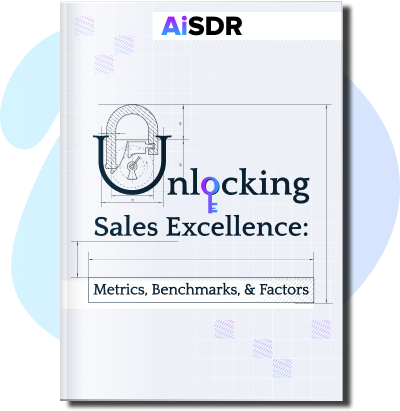8 Phrases That Kill Sales Deals

Find out the 8 phrases you need to avoid if you want to keep deals moving
Words matter a lot in sales. The phrases you use will build trust or sink a deal.
In spite of your best intentions, well-meaning statements sometimes make prospects feel uncertain, pressured, or even offended.
Here are eight common phrases that will do your sales more harm than good. But by recognizing and trying to avoid them, you can strengthen your email writing and keep deals moving forward.
“Trust me”
When was the last time you saw a movie where a character said “Trust me” and everything worked out well?
Sales is the art of building enough trust that a person’s willing to entrust their money to you in as short a time as possible. And “trust me” is probably the biggest red flag a salesperson can say (and it’s something we make sure to train AiSDR to omit from its emails).
If a prospect trusts you, you should need to say it. At best, it’s offputting. At worst, it’s a deflection tactic or weasel word that comes off as condescending, that you don’t want to answer a lead’s concern, or that you think they won’t understand your answer.
“To be honest”
All the red flags for “Trust me” are still flying for “To be honest”.
“To be honest” might be a touch worse though. This phrase makes it sound like you weren’t being 100% honest during your previous conversations.
Honesty is the best policy in any sales conversation, and calling attention to it is something best left unsaid.
“Are you the decision-maker?”
In addition to building trust, sales is about establishing a rapport with prospects. And this question will torpedo your rapport regardless of whether or not they’re a decision-maker.
It sounds rude, almost like you’d end the conversation immediately if they aren’t the power behind the decisions.
It’s also naive because even if they say yes, they might not be the only stakeholder. And who knows? If the lead’s not a decision-maker, this might return to bite you in the future should they get promoted.
“Can you afford us?”
Knowing whether or not a lead can afford your solution is an important aspect of lead qualification.
But there are definitely better ways to approach the topic than by saying “Can you afford us?” or “We don’t have a cheap plan.” This will most likely offend a lead, and they won’t be inclined to refer any connections to you. It’s hard enough talking about money, so don’t make it worse for yourself.
A more neutral way to approach this topic is to ask them “What features are you looking for?” or “What’s your budget?”
If you have a multi-tier pricing model, this will allow you to suggest a specific plan that fits their range. Or if you have a flat price, you can quickly qualify or disqualify.
“I think we can do that”
If a prospect asks the question “Can you do this?”, your answer should be yes or no. Because either you do or you don’t. There’s no maybe, probably, or some other form of waffling.
Nothing stops you from adding more context like “No, we don’t do this yet, but it’s on our roadmap for Q3” or “No, but you can request custom integrations.”
Admittedly, predicting all potential questions is impossible. If a lead asks a more complex question, uncertainty is okay. Just acknowledge the question by saying “That’s a good question”, telling them that you’ll find the answer, and passing it along during your follow-up.
In the end, a wrong answer will damage your sales deal more than waiting for one.
“We don’t usually do this, but…”
Now we’re diving into a question of ethics. On the one hand, it seems like a special tactic for pushing a client closer to a decision and sealing a deal. Like “you can my back, I scratch yours.”
But on the other hand, is it okay to imply that you give certain prospects special treatment? Either they’ll scoff and approach a deal with you more skeptically, or they’ll start to wonder what’s stopping you from revoking special privileges for no particular reason.
“Do you need a few days to think about it?”
You’ve gone through multiple stages of your sales funnel or pipeline, from prospecting a lead to addressing objections. And all that’s left is closing the deal after a demo. By this point, your lead is showing plenty of intent.
So do you really want to end your conversation with “Do you need a few days to think about it?”
Not only is it a weak way to end your sales demo, but it carries the risk of sparking second thoughts.
While you don’t want to end by asking “So you wanna buy or not?”, you should end by saying thank you and that you’ll send a follow-up in the (hopefully very) near future with any extra resources and a link to subscribe.
“CRM” (or any jargon and acronyms)
Jargon and acronyms are tricky. You live and breathe sales, so chances are many sales terms are heavily engrained into your everyday speech.
But unless you’re selling to other sales experts, don’t use industry jargon and acronyms in your conversations and sales emails. They’re probably as foreign-sounding as another language, and if your messages impose an unreasonable cognitive load on prospects, they won’t keep reading.











